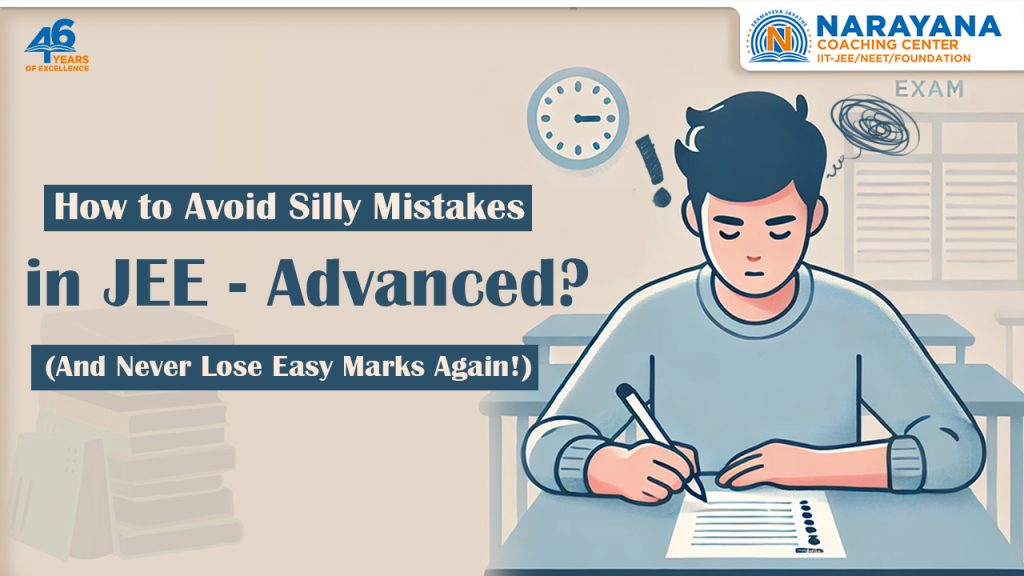
JEE Advanced is one of the toughest entrance exams in India, requiring a deep understanding of concepts and excellent problem-solving skills. However, many aspirants lose valuable marks because of silly mistakes. These errors can be avoided with proper strategies, focus, and practice. This guide will help you understand the common mistakes and provide actionable solutions to minimise them.
1. Understanding the Common Mistakes
Before discussing how to avoid mistakes, let’s analyse the most frequent errors students make:
- Misreading the Question: Misinterpreting what is asked leads to wrong answers.
- Calculation Errors: Small arithmetic mistakes can change the entire solution.
- Neglecting Units and Significant Figures: Physics and chemistry often require correct units.
- Overlooking Negative Signs: A missing negative sign can result in incorrect answers.
- Skipping Steps: Not writing down intermediate steps increases the chances of mistakes.
- Time Mismanagement: Spending too much time on one question leads to poor time distribution.
- Marking Incorrect Options: Filling in the wrong option, despite solving correctly
2. Strategies to Minimise Mistakes
Here are effective strategies to help you reduce errors and improve accuracy:
a) Read the Question Carefully
Many students rush through questions, assuming they know what is being asked. To avoid misinterpretation:
- Read the question twice before attempting it.
- Underline keywords such as ‘not’, ‘except’, ‘only’, and ‘all’.
- Identify the correct data and variables given in the problem.
b) Improve Calculation Skills
Fast and accurate calculations save time and prevent mistakes.
- Avoid rough estimations in crucial problems.
- Practise mental maths and shortcuts.
- Use approximation techniques when applicable.
- Double-check important calculations before marking the answer.
c) Use Proper Notation and Units
Physics and chemistry problems often involve units. To avoid errors:
- Write units alongside numbers to avoid confusion.
- Convert all units into the required format before performing calculations.
- Check SI units in physics and chemistry before finalising answers.
d) Avoid Overconfidence and Stay Attentive
Sometimes, students make mistakes on easy questions due to overconfidence. To stay focused:
- Approach each problem with a fresh mind.
- Do not assume that an easy question requires no verification.
- Take a deep breath and ensure you’re not rushing.
e) Develop a Stepwise Approach
Skipping steps can lead to confusion and incorrect answers. Instead:
- Write down important intermediate steps.
- Use a structured approach to solve problems.
- Verify every transition between steps to check for any missing elements.
f) Manage Time Efficiently
Poor time management often leads to panic and silly mistakes. To manage time effectively:
- Allocate specific time for each section.
- Avoid spending excessive time on a single problem.
- Move on if a question is too time-consuming and return to it later.
- Practise solving full-length papers within the time limit.
g) Double-Check before Submission
A quick revision of your answers can catch many errors. To do so:
- Allocate 5–10 minutes at the end for review.
- Verify calculations and units.
- Ensure correct options are marked on the OMR sheet.
- Recheck answers to tricky problems.
3. Exam Day Tips to Avoid Mistakes
Even with good preparation, maintaining composure on the exam day is crucial. Follow these tips:
- Get Adequate Sleep: A well-rested mind helps reduce errors caused by fatigue.
- Stay Hydrated and Eat Light: Avoid heavy meals before the exam to stay alert.
- Read Instructions Carefully: Ensure you fully understand the question paper format.
- Attempt Easy Questions First: Start with the easier problems to build confidence.
- Stay Calm and Focused: Do not panic if a question seems tough; move on and return to it later.
4. Importance of Mock Tests
Mock tests help identify weak areas and improve accuracy. To make the most of them:
- Analyse mistakes after every test.
- Identify patterns in errors (e.g., calculation mistakes, misinterpretation).
- Simulate exam-like conditions while practising.
- Work on improving speed without compromising accuracy.
5. Conclusion
Silly mistakes in JEE Advanced can cost valuable marks but can be minimised with the right approach. By reading questions carefully, improving calculations, managing time wisely, and practising regularly, you can significantly reduce errors. Implement these strategies in your preparation to ensure that your hard work translates into success.
FAQs
- How can I avoid calculation mistakes in JEE Advanced?
Practise mental math, use a systematic approach, and double-check important calculations before marking the answer. - What should I do if I panic during the exam?
Take deep breaths, move on to an easier question, and regain composure before attempting tougher problems. - How important is time management in JEE Advanced?
Effective time management ensures that you can attempt the maximum number of questions with accuracy, reducing last-minute rush and errors. - Should I use shortcuts in JEE Advanced?
Shortcuts can be helpful but must be used with caution. Only apply them if you are confident in their accuracy. - How often should I take mock tests?
Take at least 2–3 full-length mock tests per week in the last 2–3 months before the exam, and analyse your mistakes thoroughly.
